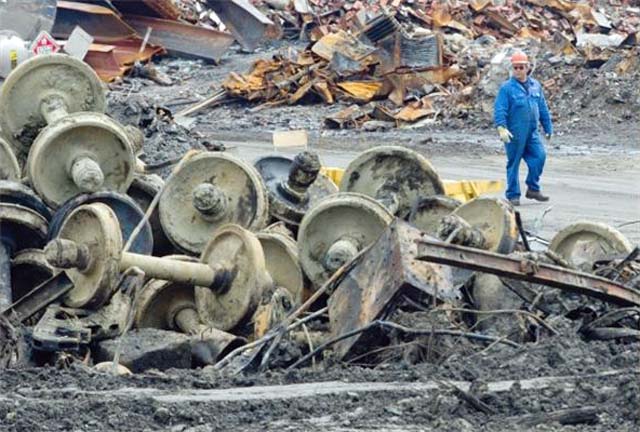A portion of the aftermath at Lake Megantic - Date/Photographer unknown. 13 February 2014 Lake Megantic Claimants Go After Ottawa Alleging Transport Canada Was Grossly Negligent Lake Megantic Quebec - Claimants in a class-action case springing from the Lake Megantic tragedy last summer are also targeting Transport Canada, alleging gross negligence in the way the federal rail regulator applied rail-safety rules.
An amendment was filed Wednesday.
It broadens a request to Quebec Superior Court initiated last July to authorize a class action on behalf of victims.
Among new elements, the filing claims Transport Canada was "grossly negligent in its oversight role" regarding railway operator Montreal Maine & Atlantic Canada Company (MMA).
The federal regulator "failed to establish any effective or sustainable oversight approach in the face of MMA Canada's open non-compliance with its regulations," the amendment states, calling the rail operator "substandard."
MMA Canada "had been involved in at least 129 accidents since 2003 in Canada alone, including 14 main track derailments, making it the most unsafe railway operator in North America," according to the filing.
The railway was forbidden, the claimants state, from carrying "any dangerous goods" along the "poorly maintained" track where the derailment of a runaway oil train near the Maine border claimed 47 lives last 6 Jul 2014.
Transport Canada "was aware that MMA Canada was not permitted to transport dangerous goods" along that track, "and yet it nonetheless permitted the almost daily transport of the highly combustible and volatile Bakken Shale Liquids on it in contravention of its obligations," the filing adds.
"Had Transport Canada carried out its regulatory function adequately, the disastrous train derailment would not have occurred," it states.
Transport Canada conducted "a series of investigations and interventions" involving MMA Canada from 2004 until spring 2013, the filing states, and on 20 occasions "found it to have violated several sections" of the Canadian Railway Operating Rules.
On eight occasions, the filing states, infractions "included a failure to correctly apply brakes to stationary trains."
The filing adds that MMA was operating its trains with a lone engineer, "notwithstanding" that the regulator knew trains were transporting "explosive" Bakken Shale liquids and gases.
The fresh allegations have not been proven in court.
The filing brings the number of respondents in the case, individuals as well as corporations, to 52.
The formal respondent for Transport Canada is the attorney general of Canada.
The filing also states that the Canadian Transportation Agency (CTA) failed to ensure that MMA Canada and related companies were "adequately insured in the event of an accident," and "failed to conduct an appropriate risk assessment in determining the level of insurance that should have been carried."
The CTA is an independent, quasi-judicial economic regulator covering air, rail, and marine transport.
Transport Canada was not immediately available for comment.
Jan Revensbergen.    | 

